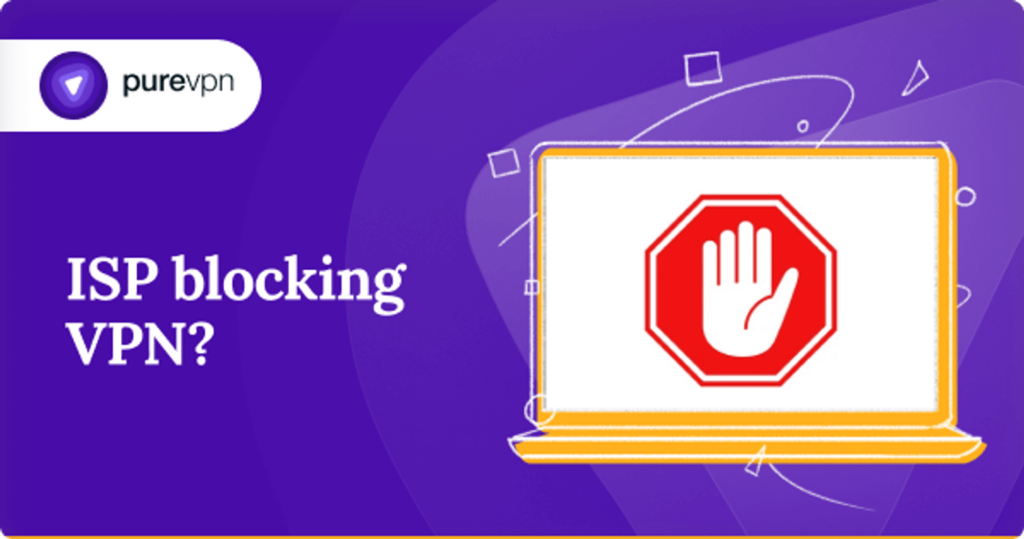The importance of data as an asset is growing rapidly. You have probably noticed that you have to block numerous trackers and cookies just to preserve your privacy. Nowadays, individuals are becoming more aware of the value of their personal data and use various tools like VPNs to add an extra layer of protection online.
However, a VPN can sometimes be the very reason why you are unable to access the internet. You might be wondering that besides preventing access to geo-restricted content, why would someone block VPNs? Well, you are forgetting about the gatekeepers of the web, meaning Internet Service Providers!
Find out everything you need to know about your ISP blocking VPNs (and how to avoid it) below:
Can your ISP block VPNs?
Yes, absolutely. What a VPN does is encrypt the data sent to and from your device (mobile phone, laptop, or tablet). However, it does not replace your ISP that provides you with internet connectivity.
Normally, your ISP can easily monitor what you are up to online – even if you use HTTPS websites, which only encrypt the data being transferred and not your entire online activity. When it comes to HTTP websites, your ISP has complete visibility of your traffic .
A VPN, in contrast, secures your entire connection with top-of-the-line encryption. This prevents your ISP from gathering any data related to your browsing activity, with the exception of your VPN provider if it is popular.
Why is your ISP blocking VPNs?

The idea of your ISP blocking VPNs may seem surprising, but there are a few reasons why they might. These include:
- Legitimacy: VPNs are banned in some countries like Iraq and Turkmenistan. ISPs are required by law to block all VPNs to comply with the government’s regulations.
- Network management. Since VPNs enable users to bypass ISP throttling, ISPs may resort to blocking them in an effort to manage their network traffic.
- Collection of data: If you use a VPN to encrypt your data, your ISP won’t be able to collect and sell it to advertisers for a profit.
It is also possible that your ISP simply has a negative view of VPNs and therefore blocks them on their network. However, as VPNs gain popularity for privacy protection and accessing geo-restricted content, blocking them has become more difficult. As a result, most ISPs do not block VPNs unless there are legal requirements to do so.
How does your ISP block VPNs?
Your ISP can use several methods to block your VPN connection, such as:
Blocking VPN server IP addresses
One of the easiest and most common methods is to block the IP addresses of the VPN servers. This is the same approach used by websites – like streaming sites – to block VPN users. If you have an encrypted connection and your traffic is routed from your personal IP address to a data center’s IP address (instead of a website), your ISP may interpret this as VPN use and block the connection.
Blocking specific ports
Another way for ISPs to block VPNs without targeting individual servers is by blocking certain ports. All VPN protocols use a distinct port that can be blocked by ISPs. For instance, port 443 blocks OpenVPN TCP, and port 51820 blocks WireGuard.
Using Deep Packet Inspection
To block VPN connections more precisely, ISPs can use DPI to examine your traffic. VPN protocols use a unique signature when encrypting data that can be easily detected by network analysis tools such as Wireshark.
Blocking VPN websites
Some ISPs go a step further and block VPNs directly at the source by banning every VPN sign-up page and website they come across. This approach is more convenient and quicker than attempting to intercept numerous VPN users, though they can resort to other unblocking tools like proxies or Tor to access blocked VPN websites.
All in all, ISPs have several ways at their disposal to block VPNs. However, the effectiveness of these methods can vary depending on the VPN protocol and VPN provider used.
Ways to bypass ISP VPN blocks
Is your ISP taking steps to prevent VPN usage? Fret not! There are multiple ways to get around these restrictions and enjoy the online privacy and security you deserve. Here is what you need to do if you want to:
Access blocked VPN websites
The practice of blocking websites has been used in censorship for as long as we can remember. If your ISP has blocked VPN websites, you can try accessing them directly by entering their IP address in your web browser.
If that does not work, using Google Translate can help you get around the block in some cases. However, the easiest way is to switch your network. You can sign up and install a VPN by using a friend’s internet or your mobile data.
Bypass blocked VPN servers
There is not much that can be done besides trying another VPN server if your ISP is blocking VPN IP addresses. If the server you want to use is blocked, just switch to another server as most good VPN providers offer thousands of servers that are updated regularly to evade censorship and blocking.
Dodge blocked VPN ports
If your ISP has blocked a couple of ports, no reason to worry. There are thousands of ports on the internet, and your ISP cannot block all of them. You can switch to a mainstream port like the 443 port used in HTTPS connections, as your ISP would never block this.
Evade network analyzers
The only way to avoid network analyzers is by masking your VPN traffic as regular traffic. If you are a tech-savvy individual, you can take the DIY route and use obfsproxy to mask your traffic. Alternatively, you can use the VPN obfuscation feature that many premium VPNs like PureVPN come with.
To sum it up
VPNs are quite popular among individuals who want to protect their online privacy and security. However, some ISPs may block VPNs using various techniques. The good news is that there are multiple methods available to bypass these restrictions and use VPNs. Give the solutions mentioned above a try and let us know which one worked best for you!









